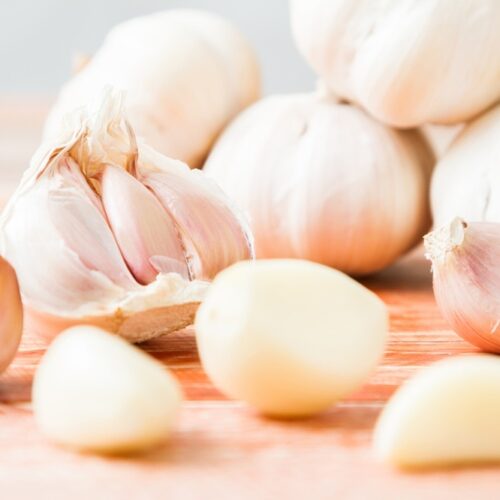
Winter brings dozens of viruses and other health complaints, often leaving us feeling run-down or reaching for the tissues. Nutritionist Caitlin Reid reveals the foods which can help you beat the winter woes.
Colds and flu
A runny nose and a sore throat are two signs that winter has arrived. Colds and flus, as droplets in the air, spread from person to person when people cough or sneeze. They can be inhaled directly, or be spread when a person touches a surface where droplets have landed. Germs then enter the body via the mouth, nose or eyes. Although generally not life-threatening, they cost our society an enormous amount in terms of medical visits, sick days and general discomfort. While there is no evidence that catching a cold or the flu is related to what we eat, nutrition is extremely important for maintaining the body’s immune function. The immunity system can be boosted with these foods:
Citrus fruits
Because they are packed full of vitamin C, citrus fruits have been found to help reduce the duration and severity of a cold when taken as a preventative measure. A review of the research has found that regularly consuming 200mg of vitamin C shortens a cold’s duration by 8% in adults, and 14% in children. Large doses of vitamin C are also likely to alleviate symptoms of a cold, making it easier to endure. If you eat your 5+ a day, you’ll be getting 150-200mg or more vitamin C daily already. For a winter boost, add more seasonal citrus fruits – it’s what our body needs!
Garlic
The old wives’ tale that garlic helps fight colds and flu may just be true. The health benefits of garlic can be attributed to allicin, an organic compound which gives garlic its characteristic odour and many of its antioxidant properties. A study published in the journal Advances in Therapy found that people given a garlic supplement containing allicin had a shorter duration of illness and were less likely to develop a cold than those who didn’t take the supplement. When using garlic in cooking, get the best out of it by allowing it to stand for 10-15 minutes after it’s chopped. The chopping activates an enzyme which releases some of the beneficial compounds in garlic. If you cook it too soon, the enzyme won’t have had time to work its magic. Try dishes such as Beef tikka sizzler wraps, Laura’s Mediterranean chicken or Rebecca’s spicy beef. These recipes include garlic or capsaicin-containing chilli, which may temporarily open up nasal passages and airways, to breathe more easily.
Drink green tea
Not only does green tea keep you alert yet relaxed, it may also reduce the likelihood and severity of illness. A 2007 study published in the Journal of the American College of Nutrition showed that people taking a preparation of green tea as a capsule experienced nearly one-quarter fewer bouts of colds and flu and had one-third fewer sick days compared with those on a placebo. The immune systems of the people taking the green tea capsules produced more cells that fought off illness-causing bacteria and viruses. Laboratory studies have also found compounds from green tea can inhibit an influenza virus. Anyone for a cuppa?
Winter depression
Has winter got you down? Well, you’re not the only one. Seasonal affective disorder (SAD), also known as winter depression, is a form of depression caused by a chemical imbalance in the brain related to a lack of light in winter and subsequent changes in circadian rhythm (body clock). While SAD probably affects few New Zealanders, more may suffer from a milder version known as subsyndromal SAD, which causes depressive symptoms such as lethargy, anxiety, moods swings, overeating and sleep disturbances.
Eat low GI carbohydrates
Pasta and other low-GI carbohydrates, such as whole grain bread, have been found to raise serotonin levels in the body. Serotonin is a ‘satisfaction’ neurotransmitter which boosts mood and well-being, so eating pasta can help restore the balance of ‘happy’ chemicals in our brain. Not all carbohydrates are equal, so avoid refined, sugary carbohydrates which give a short-term serotonin boost at the expense of a sharp drop soon after. Stick to low-GI carbohydrates and you’ll not only maintain your serotonin levels, you’ll reduce cravings for sugary foods. Try our Free-form individual lasagne recipe.
Snack on yoghurt
Yoghurt contains tryptophan, an amino acid which is needed to make serotonin. Yoghurt also contains carbohydrates, which help make tryptophan more available to the brain, as well as calcium, which makes the brain more efficient at using tryptophan. Furthermore, according to a study published in the European Journal of Clinical Nutrition, choosing a yoghurt containing probiotics can boost the mood in people who are already suffering from a low mood.
Get your vitamin D
Australian research has found that extra vitamin D can significantly enhance the mood in healthy people. To boost your own mood, make sure you’re getting your dose of ‘the sunshine vitamin’. During winter, aim for 30 minutes in the sun on most days, with 15% of your skin uncovered by clothes. Many of us don’t get enough sunshine in winter, so top up with salmon, tuna and eggs – all good sources of vitamin D – or try vitmain D-fortified foods such as Anlene milk.
Eat Brazil nuts
Five studies have reported that a deficiency in the mineral selenium is associated with a poorer mood, but just one or two Brazil nuts each day will help. Moderation is important though – if you have eight Brazil nuts every day, you would be in danger of getting a harmful amount of selenium.
Coughs and chest infections
A tight chest, wheezing, and constant coughing are all signs of a chest infection. Two common chest infections – bronchitis and pneumonia – are most common during the cooler months and can be caused by either a virus or bacteria. Young children, the elderly, smokers, and people who are already ill are most at risk of developing chest infections.
Cook with colour
Try yellow and orange veges such as carrots, pumpkin and squash. These vegetables are great sources of beta-carotene, an antioxidant which breaks down in the body to form vitamin A. Vitamin A helps the proteins which regulate cell-to-cell communication, the foundation of the immune system. Research also suggests vitamin A may help keep the respiratory system healthy, which is particularly helpful when you have a cold or the flu.
Sip on chicken soup
In 2000, US researchers discovered why chicken soup really is a remedy for the common cold. In addition to providing nutrition and hydration, the study found chicken soup contains anti-inflammatory properties which could help ease chest infections. Homemade or bought chicken soup will still have therapeutic benefits provided it’s served hot; heated fluids are better than cold fluids when you’re trying to remove mucus from the upper respiratory tract.
Get your vitamin D
Make sure you get enough vitamin D as research has found it reduces the likelihood of respiratory infections. A recent US study of 19,000 adults and adolescents found healthy people with the lowest vitamin D levels were about 40% more likely to have had a recent respiratory infection than those with higher vitamin D levels. The risk is even higher for people with chronic respiratory disorders such as asthma and chronic obstructive pulmonary disease (a progressive disease which makes breathing difficult), so ensure you get a little sunshine each day, and eat foods high in vitamin D such as tuna, salmon and eggs.
Eat beef and lamb
Apart from being iron-rich, beef or lamb is also a great source of zinc, an important mineral for the production of immune cells. Zinc also ensures the proper function of leukocytes – white blood cells which protect the body against infection and foreign materials. For this reason, zinc supplementation has been considered as a means of reducing respiratory tract infections, although the evidence is still weak. More research is needed to understand the role of zinc in the prevention and treatment of colds, and to understand how it may work.
Winter weight-gain
Cold weather tends to move life inside – around the dining table, onto the sofa and underneath blankets. We use the lower temperature as a justification for our inactivity, and illogically think we need more food for fuel, despite our reduced movement. Loose track-pants mask our growing waistline, with the average person gaining between a half to one kilo during winter. But weight gain during winter doesn’t have to be inevitable.
Enjoy a trim milk hot chocolate
A mug of a trim milk hot chocolate kills two birds with one stone – you’ll crush sweet cravings and get a dose of milk. According to researchers from the University of Tennessee, trim milk has it all: calcium to increase fat breakdown in fat cells, magnesium and phosphorus to enhance calcium’s effects, and protein to preserve muscle mass during weight-loss. Enjoy your hot, trim milk drink as you curl up in front of the heater.
Fill up with salad
Eating a big salad before a meal can reduce your kilojoule intake by up to 17%, depending on the type of salad and dressing. It does this by creating distension in the stomach, which enhances feelings of satiety and reduces overall kilojoule intake. If you don’t like eating salads in winter, low-kilojoule veges such as courgettes and broccoli will do the trick, too.
Feeling lethargic
An aching body, sheer fatigue and drowsiness are all signs of lethargy. While at times there can be more serious reasons behind fatigue, lethargy linked to the common cold can soon be alleviated with sleep, stress reduction, rest and good nutrition.
Eat thiamin-rich foods
Thiamin, a B vitamin, helps to break down carbohydrates into usable energy, helping you power through the day with a spring in your step. Inadequate thiamin can cause overall lethargy, a loss of appetite and feelings of numbness and weakness. Boost your daily intake by adding two spoonfuls of thiamin-rich wheatgerm to your morning cereal.
Eat 3-4 serves of red meat a week
Consuming adequate iron prevents not only anaemia, but also feelings of lethargy. Iron also boosts immunity. Eating iron-rich red meat is also a great way to get a dose of the amino acid tyrosine, which boosts the levels of brain chemicals dopamine and norepinephrine. These can help you feel more alert and focused. Boost your iron intake with our Beef steaks with Brussels sprout and potato gratin recipe.
Get enough vitamin B12
This important vitamin works closely with other B vitamins to regulate the formation of red blood cells and to help iron function better in the body. Inadequate vitamin B12 is linked to fatigue, shortness of breath, and numbness and tingling in toes and fingers. Vitamin B12 also helps synthesise the coenzyme S–adenosylmethionine, a compound involved in immune function and mood, so eat foods such as lean meat, fish and low-fat dairy products for a healthier winter.
Dry skin and lips
Chilling winds and extreme temperature can give us dry skin and chapped lips. Low humidity, which draws moisture from our skin, may disrupt our skin’s delicate water balance, preventing our skin from functioning at its best.
Drink plenty of water
Our skin acts as a tough but flexible protective barrier against the extremes, provided it is well hydrated. But if the skin’s water content falls below 10%, it becomes dry, less flexible, and increasingly prone to damage. You can help prevent skin from drying out in winter by drinking hot soups, water, tea, and eating a range of fluid-rich fruit and vegetables. Having plump skin is a sign the lipid structure of our cells is maintained, which is vital to the skin’s water-retaining properties and the prevention of tight skin.
Consume omega-3s
Omega-3 fats contribute many benefits to our bodily health, including a healthy skin-cell structure. The stronger the skin cells, the better the skin holds in moisture, which has the extra bonus of keeping skin looking plump. Oily fish are a great souce of omega-3s.
Get daily vitamin C
Vitamin C may help reduce skin dryness and wrinkling. A study published in the American Journal of Clinical Nutrition found that increasing vitamin C intake was associated with a small reduction in the likelihood of skin dryness and wrinkling. Another good reason to add kiwifruit and oranges to your 5+ a day.
Eat omega-6
The omega-6 fat, linoleic acid, is a component of sebum – an oily substance produced by glands in the skin to lubricate and protect it. Linoleic acid does this by blocking harmful substances from entering the skin while at the same time allowing water to leave. Higher intake of linoleic acid is associated with reduced dryness of the skin and less shrinkage. Good sources include sunflower seeds, safflower and sunflower oil.
Stomach bug
Winter stomach bugs cause unpleasant infections which last only a few days, but are extremely contagious and easily spread. You might seem fine and then, without warning, experience severe vomiting and, possibly, diarrhoea. The continuous loss of fluid can lead to extreme dehydration.
Drink sports drinks
Drinks such as Powerade and Horleys Replace help restore fluid and electrolytes quickly, while supplying you with some much-needed carbohydrates for energy. Although sports drinks are specially formulated to help rehydrate and replace electrolytes in athletes, a sports drink can also benefit people, especially kids, with stomach bugs. (Sick kids suffering from vomiting, fever and diarrhoea can dehydrate very quickly.) Cases of severe diarrhoea and vomiting require expert advice, so consult your doctor.
Try dry crackers
With an upset stomach, it’s best to eat easily digested foods such as dry crackers or toast. Crackers, dry or with a little Marmite, are the second-most recommended treatment for nausea and vomiting (second to eating small, frequent meals). They’re bland foods, which are easily digested by the body and well tolerated. When you can keep down dry crackers, other foods such as cereal, rice and fruit can be brought back into the diet, but avoid fatty and spicy foods – as they can be unsettling to the stomach.
www.healthyfood.com











